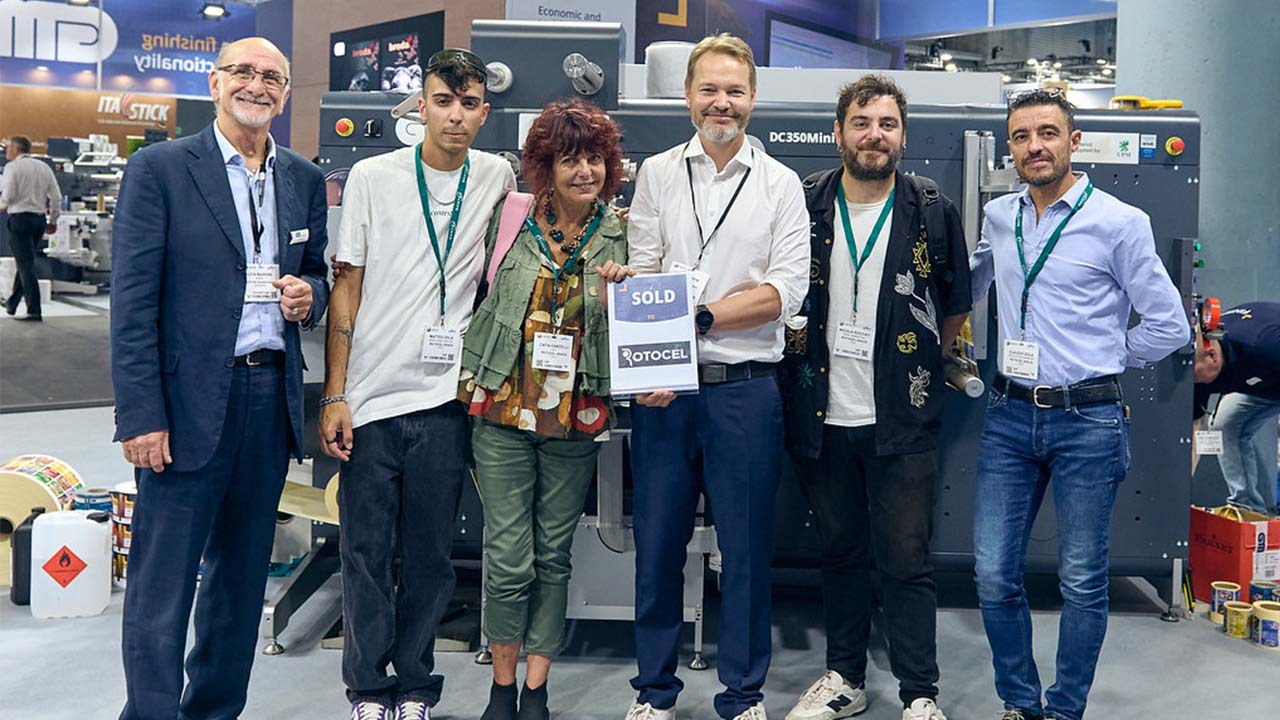Loc España focuses on diversification
The family-owned business, founded 40 years ago by Alberto Lopez as a supplier of photocopy paper, has gained a strong reputation in Spain for its focus on value-added applications since its move into label printing in 1985. This focus on specialty label production helped the company to weather the financial crisis in Europe in the years following 2008, and left it well-placed to take advantage when growth returned to the market: Loc España achieved 8 percent growth in 2016 and is on course for 10 percent in 2017.
The move into label printing took place in 1985, with the photocopy paper sector in decline. Between the mid-1980s and early 1990s, Loc España bought letterpress presses from Orthotec and Labelmen, as well as Spanish companies Jores and Tipoflex. Offset presses were also installed, from Heidelberg, Hamada, Sakurai and Minerva.
During this time, the company focused on industrial labels for the automotive, telecommunications and household appliance sectors. With a move into flexo printing in 2000, thanks to the installation of a Converpress rotary flexo machine, Loc España began to branch out. Today, the company’s label production is spread across a wide range of sectors: food and automotive are its biggest end user markets, while logistics, electronics, cosmetics, retail, pharmaceutical, industrial and defense – labels which require high durability and must survive rigorous testing – also feature.
‘We have always maintained a philosophy of diversification and added value,’ explains sales director Antonio Jódar. ‘We are very focused on specialty labels, and are well-known for this in the local market.’
Diversification
Label production is one of four divisions at Loc – the others are dedicated to RFID and intelligent labels, applicators and thermal transfer printers, and photocopier material distribution.
This diversification – both of business areas and end user sectors within its label division – was key to Loc España surviving the financial crisis, says Zoilo Lopez, head of production and son of founder Alberto Lopez. ‘The economic crisis didn’t have a big impact on us,’ he says. ‘Thanks to this diversity, we were able to adapt. And now the industry seems to be rejuvenated: clients are ordering more.’
In the wake of the crisis, Loc España began to export labels nearly five years ago. Some 13-15 percent of production is now exported – automotive labels are sent to Portugal, Germany and Poland; food and wine labels to France and Italy.
Including RFID and intelligent labels, label production represents 80 percent of Loc España’s business. ‘We focus on value-added labels,’ says Zoilo Lopez. ‘In every sector, there is potential for added value and to offer the client something they didn’t know they need.’ Sales staff are trained specifically in the company’s various end user sectors.
RFID tags are bought from external suppliers and combined with labels using an insertion machine built in-house. Applications include shoes used by marathon runners; a hospital which has tags inserted into its staff’s clothing to keep track of how many washes each item has been through; and Pacha Club in Ibiza, which uses RFID labels in its warehouse to keep track of what stock has been sold. ‘We see growth and long-term potential in intelligent labels,’ says Antonio Jódar. ‘We have the advantage of many years of knowledge and experience in this area.’
Machine sales represent 10 percent of business. Loc España distributes Toshiba and Zebra Technologies printers, as well as thermal transfer ribbons and consumables. The company has its own Loc España brand of thermal transfer ribbons and offers 24/7 technical service; Alberto Lopez, the founder’s son and Zoilo’s brother, is in charge of this area.
Toshiba applicators are also sold, while Loc España builds applicators in-house for larger clients – including bottlers and food companies – who need equipment constructed to their own specifications.
The final 10 percent of Loc España’s business is in photocopier paper – its original occupation. It sells its own-branded paper, manufactured by an external supplier, and also distributes materials from UPM and Double A.
Investment
After the company’s initial move into Converpress flexo press flexo printing in 2000 – the year it moved The production floor at Loc España’s factory in Getafe, just outside Madrid into its current 2,500sqm factory – a second Converpress flexo press was installed in 2007. The machine has eight colors, delam/relam, reverse printing, hot stamping, UV curing and three die-cutting units. During a strategy meeting that year, Loc España had decided to focus its investment on two processes: flexo and digital.
Digital capabilities came in November 2016 with the installation of a VP700 table-top printer from Spanish manufacturer VIPColor. Powered by Memjet technology, the system has been attached in-line by Loc España with a die-cutting system from Australian supplier Austik. ‘We wanted to test the water for short run work,’ explains Zoilo Lopez. ‘We’ve liked it a lot: it has freed up the presses to focus on longer runs. It’s our first step into digital printing, but we will likely invest in a bigger machine in the future. There is a trend towards shorter runs in our all end user sectors.’
In December 2016, Loc España installed a Bobst M4 flexo press, which replaced an Etipol letterpress and one Converflex flexo machine. The 8-color machine has a 430mm print width, automatic register, UV curing units from GEW, BST web guides, delam/relam, reverse printing capabilities, a coupon label unit and two Snowball die-cutting units. The press has a top speed of 200m/min – easily achieved, according to Zoilo Lopez.
‘The press has so many value-added configurations,’ says Lopez. ‘The cylinder system for flexible packaging allows us to move into that area, which is a new business for us.’
‘Thanks to the Bobst machine’s agility, it can also compete with digital presses at the 4,000 linear meter job mark,’ says Antonio Jódar. ‘We plan to use the press to produce short run flexible packaging. We have been talking to clients about this new project, though growth in this area will mainly come from new clients.’
Finishing takes place on an AB Graphic Omega, also installed in 2016, and an AB Graphic Vectra system. Platemaking used to take place in-house, but is now outsourced so the company can focus purely on printing. ‘Having installed such a high quality press such as the Bobst M4, the rest of our processes need to be brought up to scratch and improved,’ says Lopez.
Loc España has 27 full time employees, a figure which can rise to 37 if a particularly large project is being undertaken, plus a regular handful of students. Its factory is certified to ISO 9001 and 14001 standards.
Stay up to date
Subscribe to the free Label News newsletter and receive the latest content every week. We'll never share your email address.


